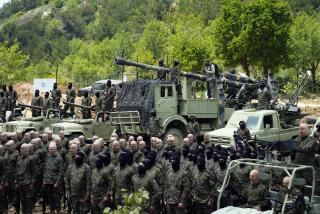Syria, Iran criticize U.S. for aiding anti-Assad rebels
BEIRUT — Syria and close ally Iran lashed out at the United States on Saturday for providing aid to Syrian rebels, the latest salvo aimed at depicting the West as resisting peace talks to end the almost two-year conflict.
Syrian Foreign Minister Walid Moallem accused the Obama administration of engaging in a “double standard,” pledging support for a political solution while helping to bankroll the Syrian insurgency.
“We know that the United States is important and has a role, [and] if it wanted, it actually can halt the violence and bloodshed in Syria,” Moallem said during a visit to Iran.
The Syrian diplomat repeated his government’s stated willingness to negotiate with armed rebels, even though it labels its adversaries “terrorists” in daily communiques.
“Even those who took up arms can play a role in building Syria’s future,” Moallem said at a news conference in Tehran.
The Iranian foreign minister, Ali Akbar Salehi, told reporters at the conference that Bashar Assad would remain Syria’s “legitimate president” until his fate is decided by voters in national elections scheduled next year.
The comments come during a week in which the conflict to oust Assad has generated intense diplomatic debate but no clear path to stopping the bloodshed that has left almost 70,000 dead, according to the United Nations.
U.N. Secretary-General Ban Ki-moon and peace envoy Lakhdar Brahimi, representing the U.N. and the Arab League, said Saturday that the U.N. would be willing to “facilitate a dialogue” between opposition and government representatives. The pair voiced regret that both sides had become “increasingly reckless with human life,” the U.N. said.
A day earlier, the White House said President Obama and Russian President Vladimir Putin had spoken by telephone about Syria and “agreed on the need to advance a political transition to end the violence as soon as possible.”
But also Friday, Russia — Syria’s other key ally — accused the United States of promoting “extremists” who are determined to seize power by force.
The barrage of criticism of the U.S. from several fronts was set off by Secretary of State John F. Kerry’s announcement Thursday in Rome that Washington would provide tens of millions of dollars in nonlethal aid to the Syrian opposition, including medical supplies and food for rebel fighters.
Kerry rejected dissident requests for weapons or other direct military aid. However, rebel forces have reportedly been receiving arms with the help of various U.S. allies, including Saudi Arabia, Jordan, Turkey and Qatar.
Throughout his trip, his first abroad as secretary of State, Kerry has repeatedly emphasized that Washington favors a “political solution” to the Syrian crisis. But he has not endorsed Russian-led efforts to broker peace talks between the opposition and the government in Damascus.
The sticking point remains the future of Assad. The opposition, backed by Washington and allied governments, says any talks must lead to the ouster of Assad and his security apparatus. Damascus rejects “preconditions” that require Assad’s removal from power.
While assailing U.S. support for Syrian rebels, both Russia and Iran have provided substantial aid to Assad’s government, though the amount of military assistance remains unclear.
Washington has accused Iran of providing arms and training for the Syrian military, a role it denies. Russia says it provides only “defensive” weapons to Syria. Last year, however, a ship carrying three refurbished attack helicopters to Syria was forced to return to Russia after its British insurer canceled coverage.
In Syria, both sides reported fierce fighting Saturday in various battle zones, including the suburbs of Damascus and the provinces of Homs in central Syria, Dara in the south, Aleppo and Idlib in the north and Dair Alzour in the east.
Opposition activists said scores had been killed in intense battles in the north-central city of Raqqah, which is under rebel siege. The city, situated along the Euphrates, is home to more than 200,000 residents but has seen its population swell with people displaced by fighting in other areas.
The government responded to the insurgent attack on Raqqah with airstrikes, according to the Syrian Observatory for Human Rights, a Britain-based pro-opposition group.
The group also reported that a rebel battalion had executed two civilians accused of collaborating with Syrian authorities in the Damascus suburb of Yarmouk, home to many Palestinian refugees. A photo on the group’s Facebook page showed what appeared to be the bodies of two men dangling from ropes, apparently having been lynched.
The two were accused of “placing chips that directed regime bombardment,” the observatory said. Human rights groups have accused both sides in the conflict of carrying out extrajudicial executions.
Special correspondent Nabih Bulos in Beirut, special correspondent Ramin Mostaghim in Tehran and a Times staff writer in Gaziantep, Turkey, contributed to this report.
More to Read
Sign up for Essential California
The most important California stories and recommendations in your inbox every morning.
You may occasionally receive promotional content from the Los Angeles Times.









